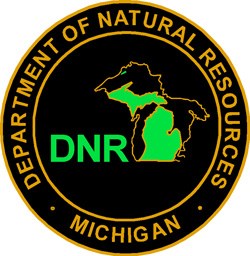NEWS RELEASE
MICHIGAN DEPARTMENT OF NATURAL RESOURCES
****************************** DNRE asks for reports of radio-collared or tagged wildlife in the Upper Peninsula
Upper Peninsula hunters, trappers, residents and visitors are asked to report any harvest or observations of ear-tagged or radio-collared wildlife to assist in an ongoing wildlife research study, the Department of Natural Resources and Environment announced today.
As part of the joint research study between the DNRE and Mississippi State University, ear tags and radio collars have been placed on wildlife captured and released in Delta and Menominee counties in 2009 and 2010.
Captured adult deer were given round, colored ear tags, and pregnant does and newborn fawns were radio-collared.
Captured bears, bobcats, coyotes and wolves were also outfitted with ear tags and radio collars.
The information gathered from these marked animals will help researchers determine the relationship between predators and fawn survival in the Upper Peninsula, while also looking at the effects of weather and habitat on fawn survival.
Reports from hunters and trappers of harvested wildlife with ear tags or radio collars, or reports of visual observations of these wildlife, provide researchers with valuable data.
"Although the research study is ongoing and won't be completed until 2012, we have been successful in capturing and radio-collaring good numbers of pregnant does, fawns and predators," said DNRE wildlife research biologist Dean Beyer. "We are asking for reports from hunters, trappers and the general public of tagged and collared wildlife to assist our efforts in the field, and any help we receive is greatly appreciated."
Wildlife with ear tags or radio collars, with the exception of wolves, can be harvested legally during the upcoming hunting and trapping seasons.
Reports of harvested tagged or radio-collared wildlife, or observations of these animals, can be made at any DNRE office in the Upper Peninsula.
Additionally, mandatory registration for all harvested black bears and furbearers must be completed at specified DNRE check stations, while harvested deer may be brought to any DNRE deer check station for voluntary registration during the regular firearm season, or to DNRE Operation Service Centers during any other deer hunting season.
A list of deer check stations and operating hours for the 2010 hunting seasons can be found online here.
Hunters and trappers are reminded that wolves are protected as an endangered species by the federal government and cannot legally be killed except in defense of human life.
Hunters and trappers should take care to ensure they can differentiate between coyotes and wolves before making a decision to harvest an animal.
Detailed information regarding coyote and wolf identification can be found in the Michigan Hunting and Trapping Guide, available at all license vendors, DNRE Operation Service Centers and online here.
The ongoing Upper Peninsula cooperative wildlife research study is funded by the Safari Club International Foundation, Michigan Involvement Committee of Safari Club International, Northwoods Chapter of Safari Club International, Wildlife Unlimited of Delta County, Menominee County Chapter of U.P. Whitetails Association, Federal Wildlife Restoration funds under Pittman-Robertson project W-147-R, and state game and fish funds.
More information about this research study can be found online here.
The Department of Natural Resources and Environment is committed to the conservation, protection, management, and accessible use and enjoyment of the State's environment, natural resources and related economic interests for current and future generations.
Learn more here
******************************
